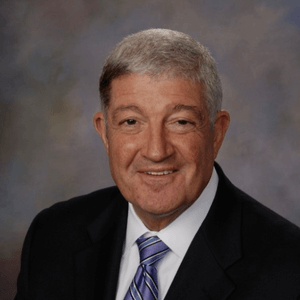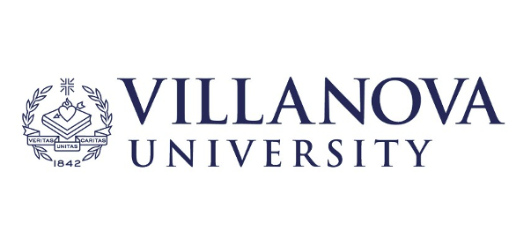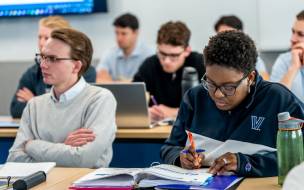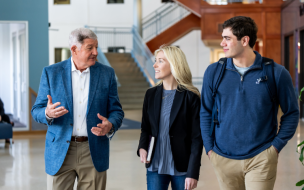There is more data available to analyze than ever before. In all areas of tax, the use of analytics, artificial intelligence (AI) and tax-driven technologies are helping to take over labor intensive tasks, creating new career enhancing opportunities for tax professionals.
Today’s tax professionals need to know how to leverage data and disruptive tech tools if they’re going to stay ahead.
Earning a master of business taxation with data analytics can help you to launch a digital and tech-focused career in taxation that will put you in a position to stand out—here’s how:
A master of business taxation can help you use technology to analyze data
Productivity and data organization platforms are helping to transform the management of taxation. Platforms such as Excel, Alteryx, and Power BI help firms gather and sort huge amounts of data.
The full-time Master of Business Taxation with Data Analytics (MBT) program at the Villanova School of Business (VSB) aims to prepare grads by integrating analytics throughout its tax curriculum.
Ed Liva is the program director of the Master of Business Taxation with Data Analytics and professor of practice at Villanova. 
“Our program allows tax professionals to become part of the value-added aspect of tax consulting in strategizing with companies to minimize their global tax burden and better analyze and evaluate the implications when making big business decisions," he says
When students join the MBT program at Villanova, they begin with a three-day immersion course to grasp data collection platforms and other useful digital tech tools.
The learning doesn’t stop there. The platforms and tools are integrated into all courses in the MBT program, so students become fluent in technical tax concepts and adept in using each tool or platform across various client situations.
Courses in the MBT program cover traditional graduate level tax courses such as Corporate and Partnership Taxation, Mergers and Acquisitions, International and State & Local Taxation, and Tax Policy and Ethics.
"The real power of the program comes from the quantitative application and learning through modelling and analytical skills that are woven throughout the coursework," says Ed.
You’ll learn about emerging issues and their application from industry tax professionals
The world of business taxation is constantly undergoing rapid change due to newly enacted tax laws and regulations, digitization, and an expanding international scope.
Future tax professionals need to have a finger on the pulse of emerging trends to understand how to manage and strategize when faced with the unexpected.
“The program and curriculum we have put together takes a different approach from other programs that have been out there for a while,” Ed says.
When devising the MBT program, Ed used his experience from working as a tax partner with KPMG to equip grads with the skills the industry is looking for in its tax professionals.
Students in the program will also learn from current and retired tax partners and professionals from Big Four and international accounting firms.
MBT program leadership also works closely with an advisory board of tax partners and professionals.
“We regularly update our curriculum and share it with our advisory council to make sure we are addressing all the needs in the industry regarding skill sets and competencies that companies look for and expect in their new hires,” Ed says.
Students in the MBT program will also be able to take part in VSB's Graduate Mentoring Program, connecting with alumni working in the industry to gain insights into how best to plan their career path and stand out in top tax careers.
You’ll learn the skills to become a sought-after tax professional
Becoming a tax professional at the top of your game means having an array of skills and expertise.
“The best tax professionals I’ve ever dealt with in my career were those that had a deep tax knowledge within specific areas, as well as a broad vision of all areas of tax so they could identify and address any needs of the client and understand the given situation,” Ed says.
He adds that by leveraging the technological advancements in the industry, the MBT will give their grads the foundation to progress even further.
“The advancements in robotics and AI in the taxation sphere frees up professionals to do a higher level of advising for their client. We’re seeing an uplift in the skill sets of professionals as much of this technology eliminates the need for mundane processes,” he says.
In the program, students will also learn core skills in leadership, critical thinking, negotiation, and teamwork to enable them to be effective leaders within this space.
“These skills are just as important in terms of dealing with, understanding, and identifying a client’s needs and communicating at an appropriate level,” says Ed.
"Ultimately, our goal is to guide students to not only becoming a highly skilled tax professional, but also to be the client's trusted business advisor," he adds.
Pursuing a master of business taxation with data analytics could be your ticket to getting ahead in your career. By blending a broadened understanding of the tax sphere with your analytical and technical know-how, you’ll stand a greater chance of launching a top tax career in a rapidly evolving sector.
Student Reviews
Villanova School of Business








